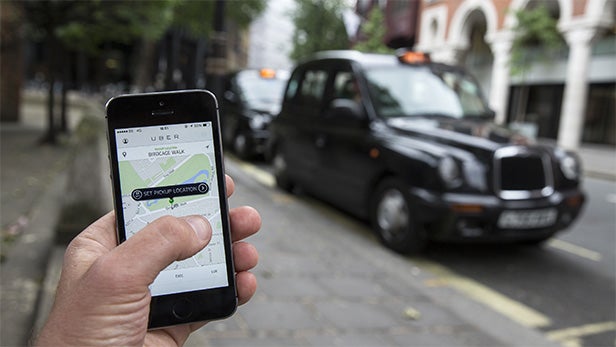Uber faces legal action in UK over workers’ rights

Uber is facing legal action in the UK over claims that it doesn’t provide its drivers with basic workers’ rights.
The San Francisco-based ride-sharing app launched in the UK in June 2012, but has met strong criticism from London’s cabbies due to its unconventional operating methods.
Amongst the new complaints are allegations that drivers don’t get holiday pay or the minimum wage.
Uber, however, claims its drivers are “partners”, not employees. The drivers are called by users of the smartphone app, which operates in London, Leeds, Manchester, Sheffield, Bristol, and Newcastle in the UK.
The legal action is being handled by law firm Leigh Day, which is acting on behalf of GMB, a UK trade union with over 700,000 members.
“Uber not only pays the drivers but it also effectively controls how much passengers are charged and requires drivers to follow particular routes,” explains Nigel Mackay. “As well as this, it uses a ratings system to assess drivers’ performance.”
He continues: “We believe that it’s clear from the way Uber operates that it owes the same responsibilities towards its drivers as any other employer does to its workers. In particular, its drivers should not be denied the right to minimum wage and paid leave.
Under the current system, Uber drivers don’t have to take breaks, and could technically work 24 hours a day without any intervention from the app.
“If Uber wishes to operate in this way, and to reap the substantial benefits, then it must acknowledge its responsibilities towards its drivers and the public,” adds Mackay.
Uber says that it is a “fully licensed” service, which connects background-checked drivers with customers, taking a 20% cut itself.
Back in May, Transport for London revealed that the number of private hire vehicle licences had grown from 52,000 to 77,000 in just one year – that’s mostly thanks to Uber.
An Uber spokesperson has responded to the legal action with the following statement:
“One of the main reasons drivers use Uber is because they love being their own boss. As employees, drivers would drive set shifts, earn a fixed hourly wage, and lose the ability to drive elsewhere as well as the personal flexibility they most value. The reality is that drivers use Uber on their own terms: they control their use of the app.”
Related: Best Android Apps 2015
The difficulty arises because Uber operates in a grey area where it’s drivers could be considered to be either employed, or self-employed, depending on your perspective.
However, the GMB union is taking a clear stance that drivers’ rights need to be maintained, irrespective of how Uber operates.
“The need for a union to defend working drivers’ rights has become an imperative,” argues Steve Garelick, Secretary of GMB’s Professional Drivers Branch. “Operators must understand that they have an ethical and social policy that matches societies expectations of fair and honest treatment.”
Garelick adds: “For far too long drivers have been considered almost ‘ghosts’ by the public who do not see them as educated or with the same needs, aspirations and desires as themselves.”
Is Uber’s operating policy fair game, or have the unions got it right? Let us know in the comments.


